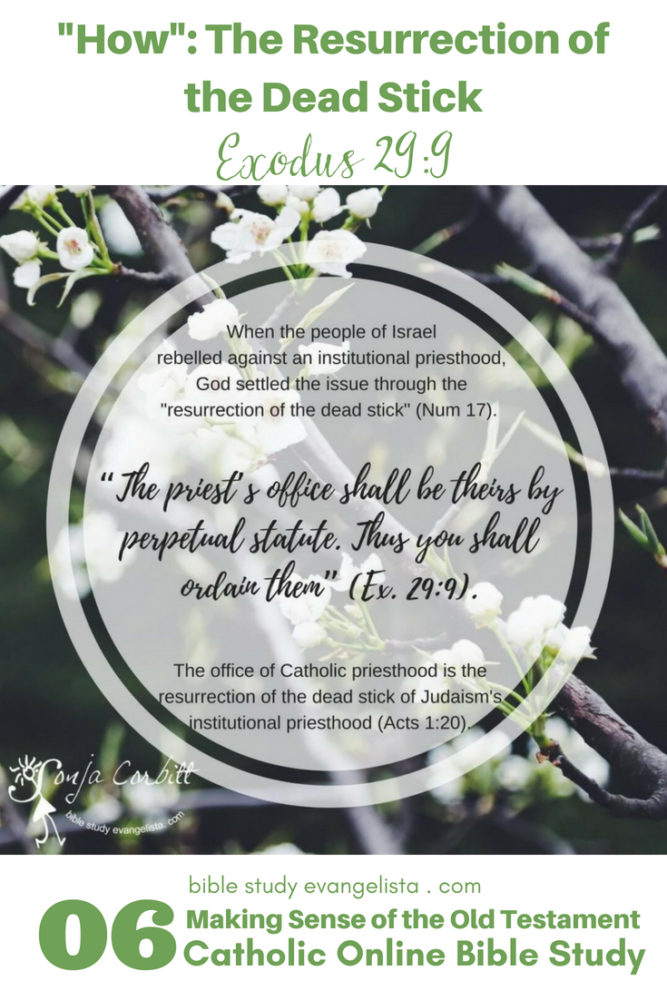I have found in explaining my conversion that nothing irritates people like the priesthood. The priest is usually a person’s first direct exposure to Church hierarchy, and let’s face it, authority just rubs us all the wrong way when it doesn’t conform to what we think or want.
Institutional priesthood is God’s idea.

Welcome Todd, Kandy, Mandi, and Maribeth, Bible Study Evangelista’s newest friends of the show! Thank you for loving and lifting me :)
LOVE the Word™ is a Bible study method based on Mary’s own practice: lectio without the Latin.
L – Listen (Receive the Word.)
O – Observe (Choose one or more of the following personality approaches to connect the passage to your life and recent events.)
F | Franciscan – Write a note of thanks and appreciation to your parish priest.
I | Ignatian – Imagine you are present by the Sea of Galilee as Jesus chooses fishermen Peter, James, and John to follow Him. Use all your senses to imagine you are there. How do you feel when He chooses you, too?
A | Augustinian – Did anything about today’s show help you appreciate your priest and the priests you know, more? Did anything convict you about how you view and talk about your priest?
T | Thomistic – Use the prayer in the E – Entrust step, below, to list by name the priests that come to mind as you read and pray.
V – Verbalize (Pray about your thoughts and emotions.)
Remembering that He loves you and that you are in His presence, talk to God about the particulars of your O – Observe step. You may want to write your reflections in your LOVE the Word journal. Or get a free journal page and guide in the right-hand margin.
E – Entrust (May it be done to me according to your word!)
.
*LOVE the Word™ exercises are offered according to FIAT: the four personalities, or “prayer forms,” explored in Prayer and Temperament, by Chester Michael and Marie Norrisey: Franciscan, Ignatian, Augustinian, and Thomistic: FIAT! These prayer forms correspond to the Myers-Briggs personality types.
Notes and References
The institutional priesthood: “The priest’s office shall be theirs by perpetual statute. Thus you shall ordain them” (Ex. 29:9).
The lay priesthood: Ex 19:3-6, 3 And Moses went up to God, and the LORD called to him out of the mountain, saying, “Thus you shall say to the house of Jacob, and tell the people of Israel… 6 …you shall be to me a kingdom of priests and a holy nation.”
1 Peter 2:5-9, And like living stones be yourselves built into a spiritual house, to be a holy priesthood, to offer spiritual sacrifices acceptable to God through Jesus Christ. 9 But you are a chosen race, a royal priesthood, a holy nation, God’s own people, that you may declare the wonderful deeds of Him who called you out of darkness into His marvelous light.
Numbers 16:1-11, the people rebel against the institutional priesthood, but they are actually rebelling against God Himself: “Therefore it is against the Lord that you and all your company have gathered together” (vs 11).
Romans 13:1-2, 1 Let every person be subject to the governing authorities. For there is no authority except from God, and those that exist have been instituted by God. 2 Therefore he who resists the authorities resists what God has appointed, and those who resist will incur judgment.
Hebrews 3:1-6, Jesus is the new Moses, our new, eternal apostle and High Priest. Where there is a High Priest, there must be other priests.
Acts 1:20 “For it is written in the book of Psalms, ‘Let his dwelling place become desolate, and let there be no one to live in it’; and ‘His office let another take.’” The institutional apostleship/priesthood is and office, just as the Old Testament commanded.
Hebrews 13:17, Obey your leaders and submit to them; for they are keeping watch over your souls, as men who will have to give account.
Episode Resources
Fulfilled, Uncovering the Biblical Foundations of Catholicism, Chapter 4, A Kingdom of Priests
Ignite, Chapters 6, The How of the Bible
Read the Transcript
You can download a complete, word-for-word transcript.
Protected Content. Click Here to sign in
Courtesy of Kristie Hynniman who does our transcriptions for you.
Image Credit
Image: https://unsplash.com/@wyman_h



As I am reading Ignite and enjoy this study, I am wondering about how to reconcile Vatican II changes to the Mass? I have only recently begun attending Latin Mass and am loving it and this has me wondering about the changes that were made. Does anyone else wonder about this too ? Like, is God disappointed in these changes? And, if so, what does that mean?
He is not disappointed, simply because as the Church officially speaks, God officially speaks. The beauty of Christian freedom is that we can worship with the Latin or Novus Ordo, and BOTH are licit. We have the freedom to choose. Yay! : )
Sonja, how can I download the transcript?
Let me know,
Carmen L.
I post them when I get them; this one hasn’t come yet. <3